Business professor Joe Ivey shares ‘strategy for life’ in final lecture prior to retirement
Kim Chaudoin |
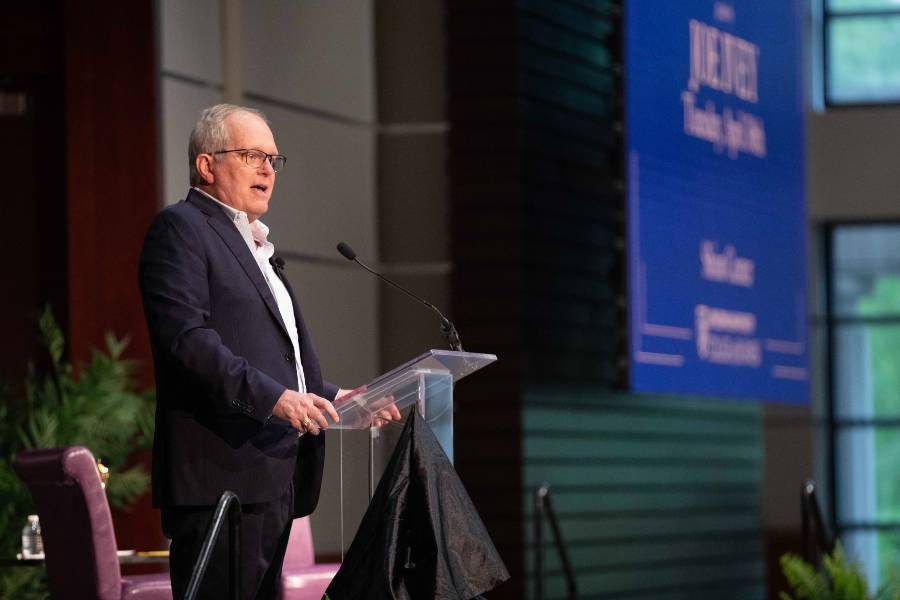
After years of imparting wisdom and business principles to countless students for nearly two decades, College of Business Professor Joe Ivey took the opportunity to deliver a final lesson to the Lipscomb University community before retiring this spring.
Ivey delivered his “Last Lecture” to an audience of over 400 faculty, staff, students, alumni, friends and family who came from near and far, with 100 more watching online, who gathered in the George Shinn Center on April 30. Several of his colleagues and former students from the College of Business paid tribute to his contributions prior to Ivey taking the stage for a final lecture. Ivey, who was on medical leave during the spring semester, officially retired from Lipscomb on June 1, leaving behind a legacy of hundreds of former students who carry the lessons he has imparted to them into organizations and communities around the world.
“By declaring something to be my last, I’m making a claim that I don’t have much more to say. However, I am hopeful that some of the thoughts we discuss today will resonate with deep meaning for some of you and will be, to some degree, timeless,” said Ivey.
The main focus of Ivey’s speech was a “Strategy for Life,” which reflected his career-long focus on strategic thinking. “At my core, I’m a strategist. In reflecting on my career, I have seen strategy woven throughout it, whether in business, higher ed administration or the classroom,” he said. “Although the practice of strategy can be difficult, the concept is really quite simple. In most contexts, strategy recognizes where you are, where you want to end up, and what steps you need to take to get there.”
“Strategy begins with goals,” he continued. “In my experience, where you want to end up—your goal and the amount of attention you pay to it—is strongly correlated to the longevity of what you want to accomplish.”
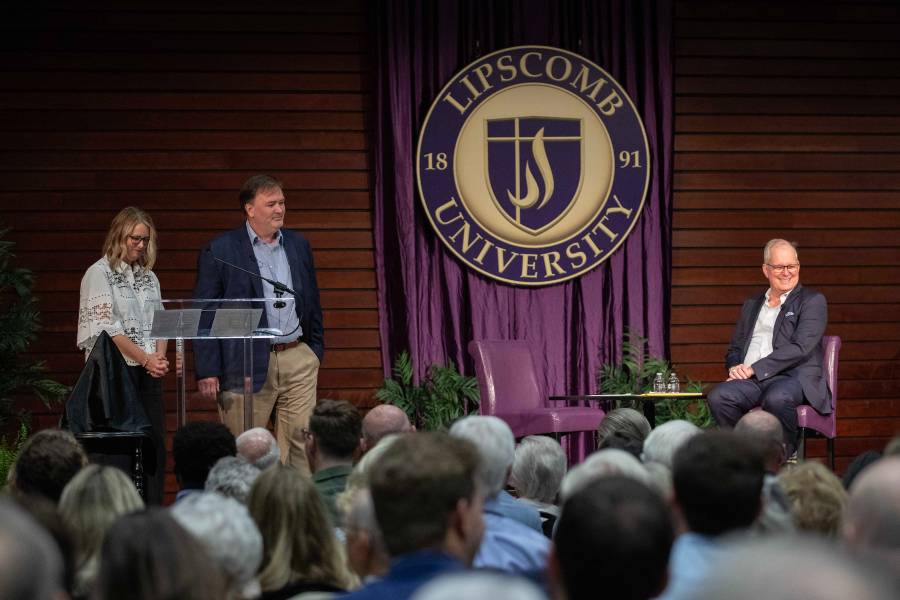
The College of Business's Allison Duke, left, senior associate dean, and Bart Liddle, associate professor of management, pay tribute to their colleague Joe Ivey.
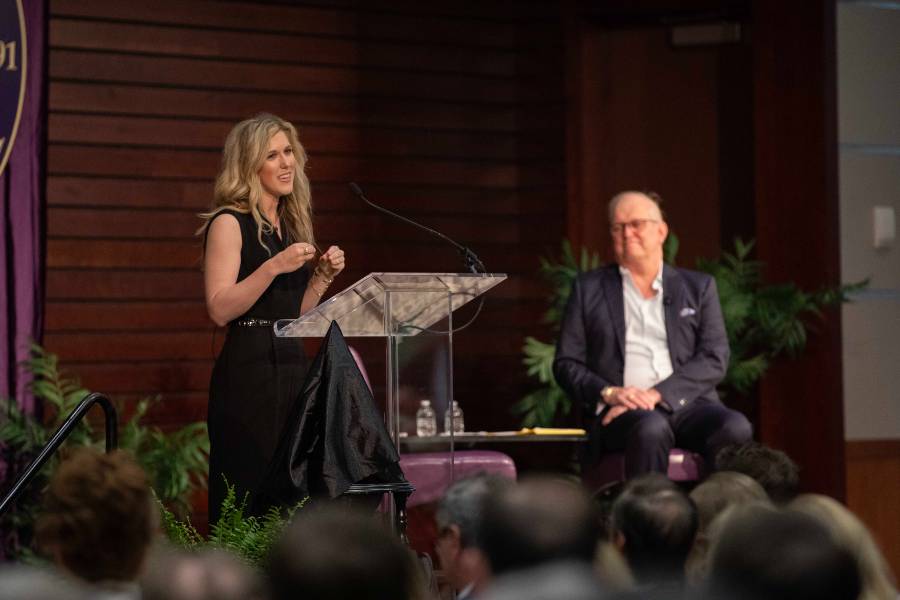
Alumna Sydney Ball shares reflections of her former professor.
Life’s purpose
In his lecture, Ivey shared his personal journey, his recent health challenges and his life purpose. As he reflected on this, he said he landed on what he believes his life’s purpose to be.
“My purpose in life is to contribute to the whole-life flourishing of those with whom I interact and to advance the Kingdom of Heaven in my sphere of influence,” he shared.
He examined his life’s purpose statement with the audience, he elaborated on four foundational concepts: contribute, interaction and influence, whole-life flourishing, and the Kingdom of Heaven. As he shared in this excerpt from his lecture:
- Contribute. We cannot do a complete life alone. The best we can do is to contribute. Some of our contributions will be greater than others. Nonetheless, they will all be partial. The real power of contributing comes from the collective and not the individual.
- Interaction and influence. Similar to the ideas presented on contributing, we have limited bandwidth to interact and influence. Although there are those with large platforms, research shows that most of us have meaningful interaction and influence with less than 150 people. The key is quality rather than quantity.
- Whole-life flourishing. Lately, there’s been a great deal said about flourishing. For our purposes, I consider flourishing to be when people are doing well in five broad domains of life: happiness, health, meaning and purpose, character and virtue, and close social relationships. In reality, I’m much more interested in the whole-life concept of flourishing rather than flourishing on just one or two dimensions. To live full lives, we cannot be one-dimensional. A flourishing life demonstrates itself relationally, physically, materially and spiritually. To the degree we have deficits in any of these areas, we have diminished our ability to flourish.
- The Kingdom of Heaven. The Kingdom of Heaven represents our existence outside of time and place. It includes the current, but it is so much more. Essentially, it is the place for which God originally created us.
“I trust they can help you to live the Kingdom of Heaven today,” he said. “Rather than being prescriptive, I present these ideas to you more as a testimony from my situation so that you’ll have room to apply these thoughts to your specific situation just as I have applied them to mine.”
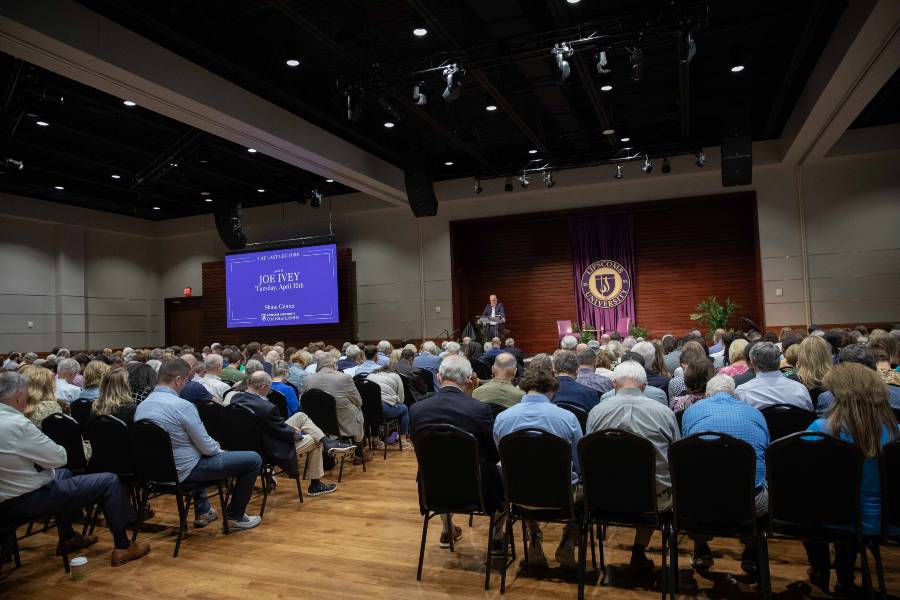
More than 400 faculty, staff, students, alumni, friends and family gathered for Ivey's last lecture on April 30.
Three lessons
Ivey offered his “pupils” three takeaways to consider that were developed after a great deal of reflection.
Develop margin. A self-described workaholic, Ivey said for 50 years he “looked for the next hill to climb. In many ways, this quest for more has allowed me to accomplish a great deal. But it came at a price. That price was often my inability to be fully present. And my inability to have margin—any unabsorbed space—in my life.” He emphasized the importance of creating space in life to be present and to engage fully with others.
Differentiate what is essential vs. important vs. not so important. Ivey stressed the need to focus on what is uniquely up to individuals to do themselves and to delegate or release the rest. “I didn’t make much distinction between things that were essential and things that were important. I lumped them all together. And then added many ‘not so important’ elements just to fill up my time and feel vital,” shared Ivey. “Upon reflection, especially from a hospital room, there are very few activities that fit this criteria and there should probably be fewer. My goal with the remaining essentials is to release as many as I can so others can grow by addressing them. Reducing essentials allows us margin to prioritize what is important. And I now believe that focusing on important activities is what will make the deepest impression.”
View love and service as fundamental behaviors for flourishing. Ivey encouraged the audience to practice self-giving love and service to others, enhancing their potential and embracing diversity. “Kingdom of Heaven love is not passive or inherently emotional. It is agape—self-giving action for the benefit of others,” he explained. “In a real sense, when we serve others, we give them the opportunity to achieve their full potential. One practical way to demonstrate love and service is to celebrate the differences of the people with whom we work and interact. Thank goodness we are not all the same. Organizations are better when we have different skills and talents.”
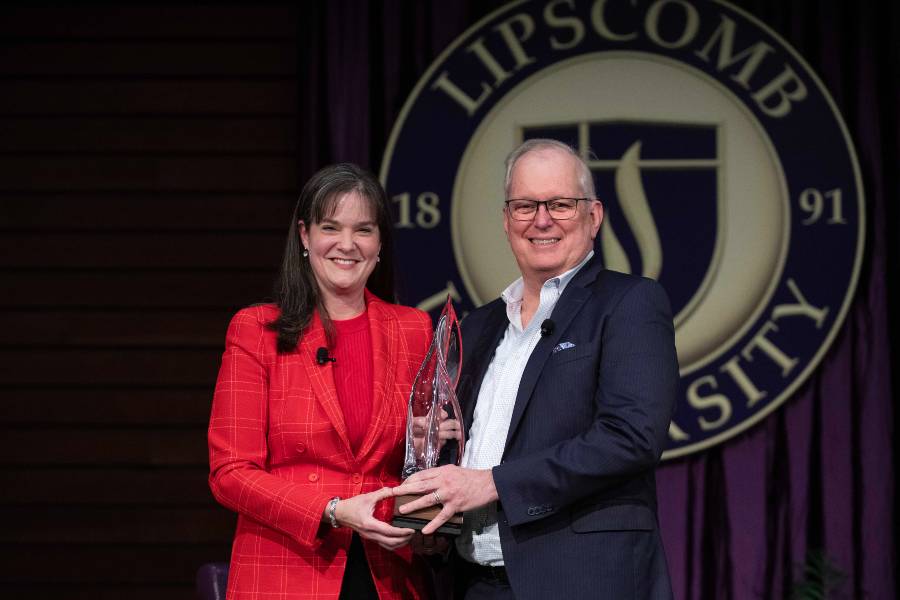
President Candice McQueen presents Ivey with a Kopio Award.
Special recognition
Following the lecture, Lipscomb President Candice McQueen made several special presentations at the lecture as tokens of appreciation for Ivey’s 20 years of service and impact at the university. He was awarded the Kopio Award, Lipscomb’s highest non-academic honor.
The Kopio Award name comes from a transliteration of a Greek word that is used to describe a person who labors to the point of utter exhaustion with the help and for the glory of God. Lipscomb established the Kopio Awards to honor those individuals who give of themselves in this manner in service to God and the community.
“This award is not bestowed often, and I can think of no one more deserving of this award than you, and I am thankful for the tremendous impact you have made on the lives of hundreds of students and on this university,” said McQueen during the presentation.
In addition, the Faculty Excellence Award in Business, established by Dick Cowart, chair of Lipscomb’s Board of Trustees, and his wife, Becky, three years ago, was renamed the Joe Ivey Faculty Excellence Award for Business. It is awarded annually to a faculty member in the College of Business.
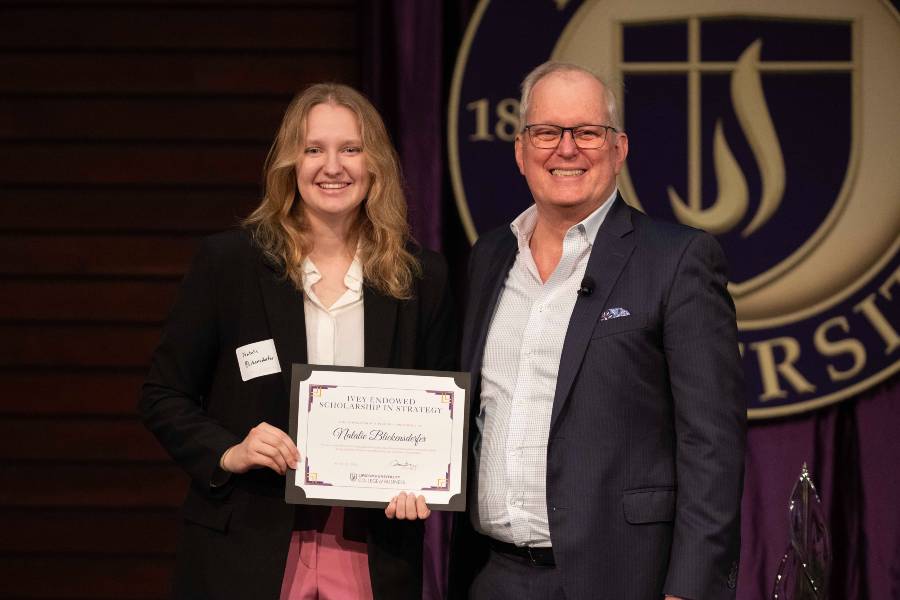
Natalie Blickensdefer was named the inaugural recipient of the Ivey Endowed Scholarship in Strategy.
McQueen also announced that Ivey and his wife, Malinda, established the Ivey Endowed Scholarship in Strategy.
“With Joe’s background in advancement and more than 20 years in higher education, he understands the importance of investing in our students and in doing that in a way that will have an impact for many years,” said McQueen. “Joe and Malinda have made an investment in the future by establishing an endowed scholarship. It is permanent and self-sustaining, allowing more students to access the transformative Christian education Lipscomb offers for generations to come.”
The Ivey Endowed Scholarship in Strategy will be awarded annually to a rising senior in the College of Business who demonstrates the greatest potential for strategy making and execution in their future career. In selecting the scholarship recipient, the faculty will consider the nominee’s commitment to the purpose of business, quantitative and qualitative analytical skills, ability to think critically and strategically, and bias toward action.
Natalie Blickensdefer was announced as the inaugural recipient at the gathering. Blickensdefer is a finance and data analytics major from Plano, Texas, who is on track to graduate in December 2025. This spring she represented Lipscomb and the College of Business as she participated in five team and individual competitions including the Supply Chain Case Competition hosted by Tractor Supply Company (1st place); Kennesaw Marketing Association Invitational (3rd place); Tennessee Valley Authority Investment Challenge Program (1st place); National Shores Sales Challenge sponsored by Perdue Chicken in Salisbury, Maryland; and the American Marketing Association International Collegiate Conference (1st place - Design Lab Marketing, 3rd place - Sales Role-Play, 4th place - Marketing Strategy). This summer Blickensdefer is an operations analyst intern at Oracle in Redwood Shores, California.
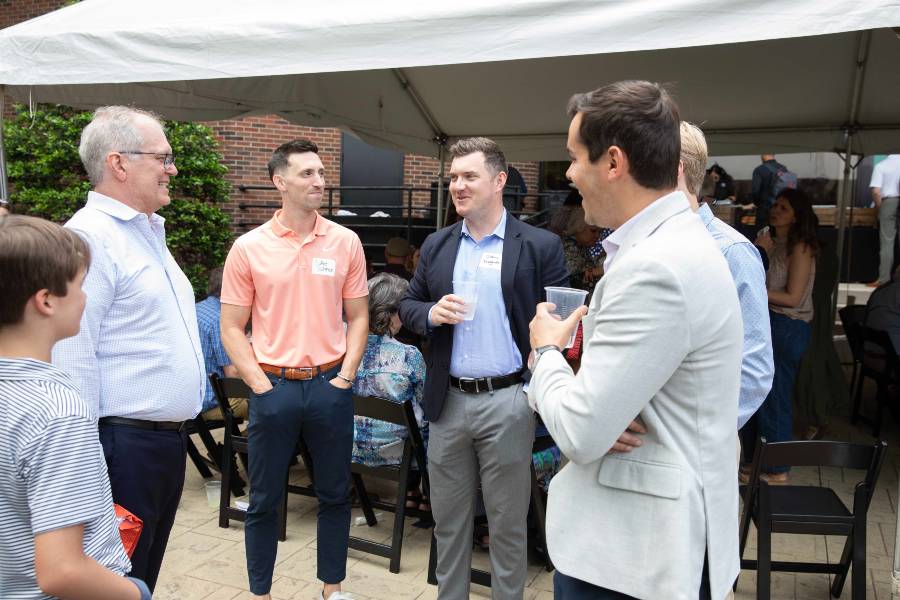
Joe Ivey enjoyed catching up with former students.
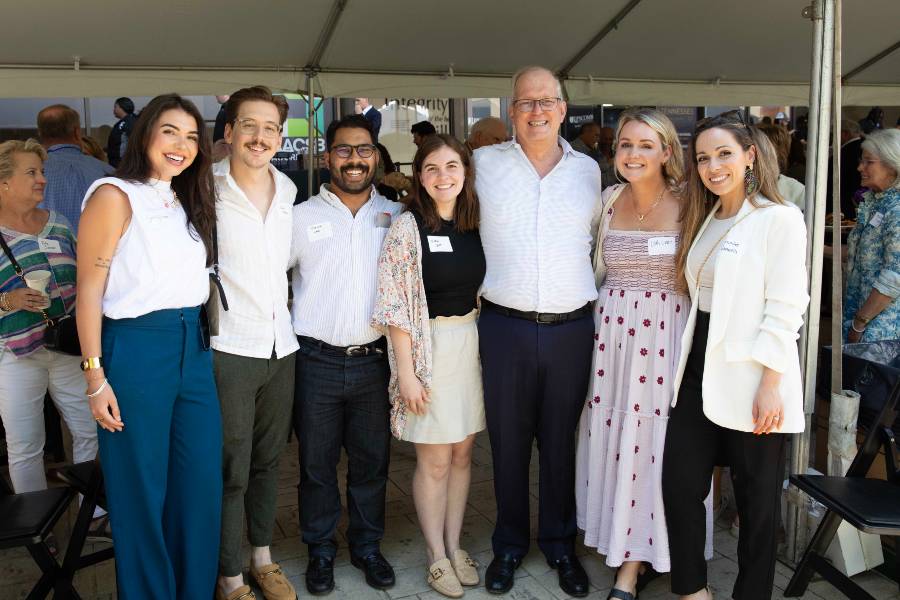
A number of former and current students attended the lecture.
Ivey served as senior vice president of advancement at Lipscomb from 2005-2010 and then joined the College of Business faculty in May 2010. During his tenure in the College of Business he served as professor of management, executive director of the Lipscomb Center for Entrepreneurship and associate dean for graduate business programs among other roles.
Prior to his work at Lipscomb Ivey served as president and chief executive officer of three companies, one of which was among the Fortune 500. He is also a former chairman of the Freed-Hardeman University Board of Trustees.
Following the lecture, Ivey hosted a barbecue luncheon for attendees.
Transcript of lecture
Find a transcript here and a video of Ivey’s presentation here. Make a gift to the Ivey Endowed Scholarship in Strategy.
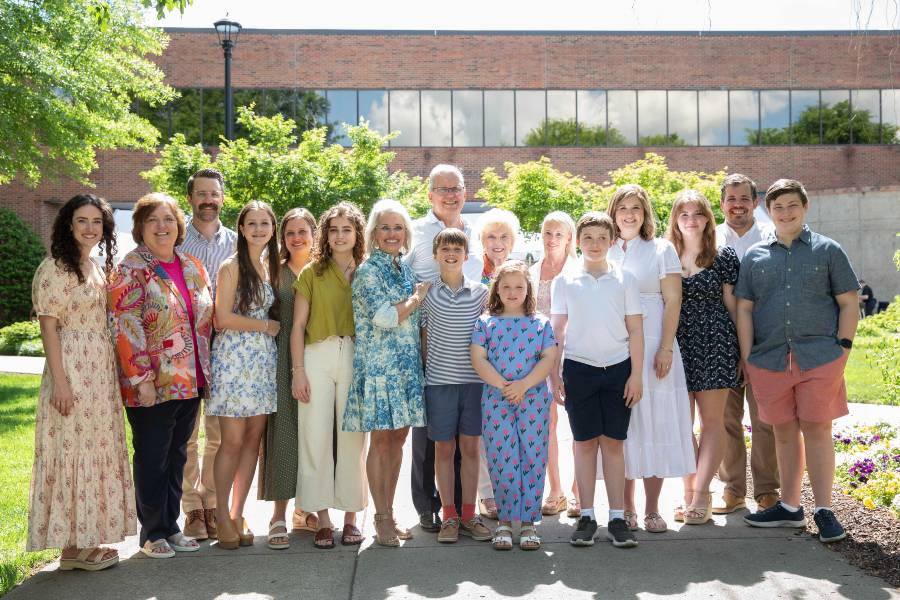
Joe and Malinda Ivey and their family.
— Photos by Kristi Jones